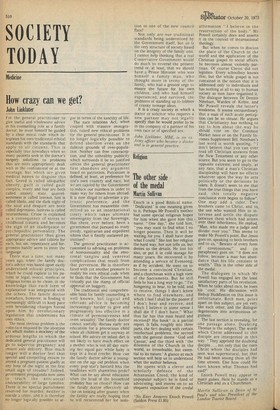Religion
The other side of the medal
Martin Sullivan
Enoch is a good Biblical name. ' Dedicated' is one meaning given to it. Perhaps Mr Powell's mother had some special religious hopes for him when she gave him this name. "One day," she told him, "you may want to find, what I no longer possess. Then it will be waiting for you. I shall have done what I could." She lost her religion the hard way, her son tells us, but denies us the details. He lost his also, or put it in cold storage for many years. He recovered it by attending a service of Evensong, as if by accident. He went on to become a convinced Christian, and a churchman with a high view of the Sacraments. But he still feels he has a long way to go. " I'm hungering to hear, to be told, and to receive, things I don't know where to find elsewhere, and which I feel I shall be the poorer if I don't hear and receive, and which I believe in some sense shall die if I don't have." What thus far has this man heard and received? His book* is a partial report. It falls, roughly into three parts, the firt dealing with certain intellectual problems, the second with the general theme 'God and Caesar,' and the third with 'the dilemma of the Church in the world, as irresolvable, but essential to its nature.' A glance at each section will help us to understand what the author believes.
He opens with a clever and scholarly defence of the Athanasian Creed, the kind of unpopular subject he is fond of advocating, and moves on to an eloquent exposition of the credal affirmation " I believe in the resurrection of the body." Mr Powell certainly does and asserts it in the context of incarnational theology.
But when he comes to discuss the place of the Church in the world and the application of the Christian gospel to social affairs, he becomes almost violently partisan. Of course Christ did not legislate. Every schoolboy knows that, but the whole gospel is not contained in the notion that it is addressed only to individuals and has nothing at all to say to human society as men have organised it. The dialogue between Dr Dennis Nineham, Warden of Keble, and Mr Powell reveals the latter's weakness. It seems extraordinary that a man of such acute perception can be so obtuse. He argues that Christianity has nothing to say to him about the way he ,should vote on the Common Market issue or on the Family Incomes Supplement Bill. Nineham's last word is worth quoting, "I don't believe that you can ever read off Christian answers from the New Testament or any other source. But you seem to go to the opposite extreme, and imply, at any rate, that a man's Christian discipleship will have no effects whatever upon the way he acts politically or the decisions he takes. It doesn't seem to me that from the true things that you have said, this totally negative conclusion even begins to follow". One may add a rider. Two brothers came to Christ, and to, the one who wanted Him to intervene and settle the dispute between them which had arisen over their inheritance, He replied, "Man, who made me a judge and divider over you." This seems to make Mr Powell's point, But Jesus goes on, speaking to both brothers and to us, "Beware of every form of covetousness;" and (in paraphrase) goes on: "it does not follow, because a man has abun'dance that his life consists in wealth." This is the other side of the medal. • The dialogues in which Mr Powell has engaged are the least satisfactory parts of his revelation. When he talks about race, he loses his 'cool.' His discussion with Bishop Huddleston on this issue is unfortunate. Both men, poles apart on this subject, are yet very like each other, and the dialogue degenerates into acrimonious argument.
The last section is revealing, for one passage alone. Doubting Thomas is the subject. The words which Christ addressed to this disciple are interpreted in this way: "They apprised the doubting disciple ... not only that the risen Christ whom the disciples had seen was supernatural, but that He had been among them all the time unseen. Else how could He have known what Thomas had said?"
Enoch Powell may appear in many guises. Here he stands as a Christian and as a Churchman.
Martin Sullivan is Dean of St Paul's and also President of the London Tourist Board.


































































 Previous page
Previous page